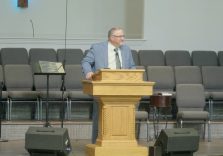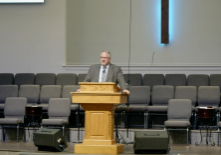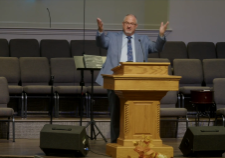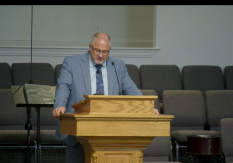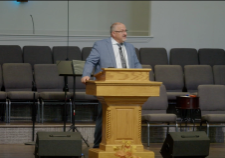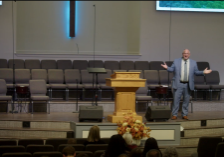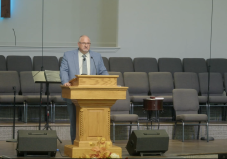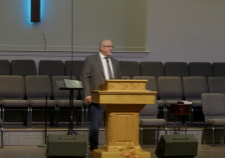The main focus of this podcast episode revolves around the lessons learned from the story of King Nebuchadnezzar in the Book of Daniel, particularly emphasizing the theme that God rules in the affairs of men. The speaker highlights Nebuchadnezzar’s journey from pride to humility, illustrating how his disregard for God’s authority led to his downfall and eventual madness. Through a detailed examination of Nebuchadnezzar’s dreams and the subsequent interpretations provided by Daniel, the speaker underscores the importance of recognizing divine authority and the consequences of pride. He calls listeners to reflect on their own lives, urging them to heed warning signs and strive for humility, thereby avoiding the pitfalls of arrogance. Ultimately, the episode serves as a reminder of the transformative power of acknowledging one’s limitations before God and the necessity of living a life aligned with humility and grace.
The podcast delves into the profound lessons learned from the Book of Daniel, particularly focusing on chapter four and the character of Nebuchadnezzar. The speaker discusses how Nebuchadnezzar, a powerful and prideful king, experiences a dramatic transformation after a series of dreams that highlight God’s sovereignty over human affairs. The narrative emphasizes the importance of humility and the consequences of pride, illustrating how Nebuchadnezzar’s arrogance leads to a significant judgment from God, resulting in his temporary madness and exile. Through this experience, he learns to acknowledge the supremacy of the ‘Most High’ and ultimately praises God for His truth and justice. The speaker encourages listeners to reflect on their own lives, urging them to recognize the signs of pride and to cultivate a humble spirit in their relationship with God and others. The message culminates in a call for personal reflection and commitment to living a life that honors divine authority, highlighting the transformative power of humility.
Takeaways:
- The podcast discusses how God rules in the affairs of men, emphasizing the importance of humility and recognizing divine authority.
- Speaker A highlights the journey of Nebuchadnezzar, illustrating how pride leads to personal downfall and a need for repentance.
- The episode emphasizes the role of personal relationships in ministry, especially for missionaries working in difficult environments.
- Nebuchadnezzar’s experience serves as a cautionary tale about the dangers of pride and the necessity of acknowledging God’s power.
- The discussion includes the unique challenges faced by foreign missionaries who must navigate citizenship and employment for effective ministry.
- Ultimately, the podcast underlines that true understanding of God leads to humility, as demonstrated by the transformation of Nebuchadnezzar after his judgment.
Transcript
Amen.
Speaker A:He's no longer in the grave.
Speaker A:If you would in your Bibles, turn to Daniel.
Speaker A:Book of Daniel, chapter four.
Speaker A:Appreciate the Cook family tonight singing for us.
Speaker A:And after the big wedding last night, Austin Cook and Hannah Shelton got married.
Speaker A:And so we pray for them as they begin life's journey together.
Speaker A:So two of our academy teachers, we're just matchmakers around here.
Speaker A:Hire these teachers.
Speaker A:Single teachers.
Speaker A:They come in.
Speaker A:Yeah.
Speaker A:So it's awesome, and it's a wonderful thing, I think, about our missionaries a week.
Speaker A:Brother Hamilton.
Speaker A:Brother Hamilton did something unique in that, got his citizenship.
Speaker A:And then actually, because normally foreign missionaries can't get jobs.
Speaker A:I mean, it's not like you can go to foreign field and go to a country, any country, and get a job if you're not a citizen.
Speaker A:And so don't get me into politics, other countries.
Speaker A:You can't get a job if you're not a citizen.
Speaker A:And so anyway, he got his citizenship and then got a job on purpose in order that he again could reach more people and uses his job.
Speaker A:And there are some benefits, of course, to that job.
Speaker A:And he wrote us a letter and said, you know, if you really feel that me getting a job is kind of not the right thing and you don't want to support me, I understand.
Speaker A:And we said, that's amazing.
Speaker A:I know a pastor up in Gainesville, took a smaller church, got a job at Chick Fil A so that.
Speaker A:Just so he could have more time, more people that he could talk to and reach.
Speaker A:And it was effective.
Speaker A:And so just, just amazing what missionaries will do.
Speaker A:Ireland's a tough place, and to be able to.
Speaker A:The personal relationships are so important in the developed world, and so just a great way to do that.
Speaker A:And so just, again, the sacrifices our missionaries make and what they do is amazing.
Speaker A:So keep them in your prayers.
Speaker A:Daniel, chapter four.
Speaker A:And this is.
Speaker A:I don't know if it's familiar to you, if you've read this particular portion very much.
Speaker A:And so chapter four is really not prophetical in nature at all, but, boy, the lessons we can learn from it about Nebuchadnezzar.
Speaker A:And so this great king.
Speaker A:Let's read the last verse as our starting point, and then we'll start from there.
Speaker A:Look at verse 37.
Speaker A:Now, I, Nebuchadnezzar, praise and extol and honor the King of Heaven, all whose works are truth and his ways, judgment, and those that walk in pride, those that walk in pride, he is able to abase.
Speaker A:Let's pray.
Speaker A:Heavenly Father, again, thank you, Lord, for your love Lord help us, Lord, to be a humble people.
Speaker A:Lord, as we are just a couple of weeks from revival meeting, I pray, Lord, that we would walk humbly with you.
Speaker A:And Lord, may we learn this life lesson from King Nebuchadnezzar.
Speaker A:In Jesus name.
Speaker A:Amen.
Speaker A:You find several times in this chapter where Nebuchadnezzar's reminded that God rules in the affairs of man.
Speaker A:I'm just going to read the end of verse 32 if you're there.
Speaker A:Still, it says there until thou know that the Most High ruleth in the kingdom of men and giveth it to whomsoever he will.
Speaker A:So the theme of the book of Daniel is God rules in the affairs of men.
Speaker A:Again, God is the one who puts kings in place.
Speaker A:He's the one who sets them down.
Speaker A:And we need to be reminded of that.
Speaker A:God rules on high.
Speaker A:He's in control.
Speaker A:And so Nebuchadnezzar, through this particular lesson he's about to learn and through the situation that God puts him through, learns again that God is the God of heaven.
Speaker A:And so it's just an amazing, amazing thing.
Speaker A:Nebuchadnezzar has another dream.
Speaker A:More troubling, it says, than the first one.
Speaker A:If you go back to verse 1, 2, and 3, more troubling than the first dream he had.
Speaker A:Remember the image that he saw in chapter two, and he asked for the interpretation of that dream.
Speaker A:And the wise men are called in once again.
Speaker A:And guess what happened?
Speaker A:The wise men again fail to be able to interpret the dream.
Speaker A:Now, this time at least, he tells them the dream.
Speaker A:They don't have to actually know, you know, tell him what, what he dreamed like the last time.
Speaker A:So, but they couldn't.
Speaker A:They couldn't tell him the interpretation of it.
Speaker A:But here comes Daniel.
Speaker A:Daniel's able to do it.
Speaker A:And he warns the king of a potential.
Speaker A:And I want you to see that too, a potential chastening by God.
Speaker A:In other words, God is warning Nebuchadnezzar, hey, if you don't change your way, there's going to be a chastening coming.
Speaker A:I will judge you.
Speaker A:And so Nebuchadnezzar does not heed the warning and begins to still brag about what he has done, the splendor of his kingdom that he built.
Speaker A:And the dream comes true.
Speaker A:Nebuchadnezzar becomes a madman, and we could say a birdman.
Speaker A:For seven years, he's walking in his palace one day and he begins to extol again his greatness and the greatness of the empire he's built.
Speaker A:And I'm telling you, this is one year after the dream like that he's done for seven years.
Speaker A:He's put out in the field to eat grass like an ox.
Speaker A:Apparently he grows, whether it's hair or feathers.
Speaker A:The Bible says this is something beyond normal.
Speaker A:Normal than just something wrong mentally or some kind of mental disorder.
Speaker A:God literally strikes him in a miraculous way in judgment.
Speaker A:He was told that his kingdom would be held in place.
Speaker A:In other words, Daniel does say to him, your kingdom is going to be held in place and that you will be restored.
Speaker A:That's kind of amazing too.
Speaker A:Seven years that this king is a crazy person and yet the kingdom is held together and he's able to return and rule over the kingdom once again.
Speaker A:By the way, there was conditions to him returning, repentance, recognizing the God of heaven.
Speaker A:Only God could have brought him from such a state.
Speaker A:Only God could have brought him back from being a crazy person.
Speaker A:Eating grass and sleeping outside.
Speaker A:It says he slept outside in the dew.
Speaker A:You know, just a crazy person.
Speaker A:Only God could have brought him back from that again to reign on the throne of the nation who had defeated all nations.
Speaker A:So let's look at this again.
Speaker A:Nebuchadnezzar's dream.
Speaker A:Look at verse.
Speaker A:Let's start in verse one and we'll read a little ways.
Speaker A:I just don't want to take time to read the whole chapter.
Speaker A:So Nebuchadnezzar, verse 1.
Speaker A:The king unto all people, nations, languages that dwell in all the earth, peace be multiplied unto you.
Speaker A:I thought it good to share the signs and wonders that the high God hath wrought toward me.
Speaker A:How great are his signs and how mighty are his wonders.
Speaker A:His kingdom is an everlasting kingdom.
Speaker A:His domain is from generation to generation.
Speaker A:So what's about to happen is he's communicating.
Speaker A:Nebuchadnezzar is communicating a testimony about why, why and what happened to him.
Speaker A:And he's communicating, he's testifying to the world.
Speaker A:I mean, he is the king over the then known world.
Speaker A:So we see his story again.
Speaker A:We see the verses 4 through 7.
Speaker A:I won't read that portion.
Speaker A:The wise man again could not, could not interpret the dream.
Speaker A:They failed once again because only God can do that.
Speaker A:Amen.
Speaker A:Only God.
Speaker A:And God used Daniel to interpret the dream.
Speaker A:Verses 8 through 18.
Speaker A:We have his dream, the dream of Nebuchadnezzar.
Speaker A:Daniel steps into the picture and he hears the dream.
Speaker A:Look at verse eight.
Speaker A:But at the last came in before me, whose name was Belteshazzar, according to the name of my God.
Speaker A:And in whom is the spirit of the holy gods?
Speaker A:And before him I told him the dream.
Speaker A:Say, notice those gods are lowercase.
Speaker A:Some time has apparently passed, even from chapter three.
Speaker A:We know between chapter two and chapter three there's about a 15 year gap.
Speaker A:So chapter two is where he sees the image of the impending leaders of the world throughout the ages.
Speaker A:You know, that they would be defeated by the Medo Persian empire, then the Grecian empire would rule, and then the Rome would rule.
Speaker A:And then chapter three we have the three Hebrew children who would not bow, who would not bend.
Speaker A:And again, they're about a 15 year gap.
Speaker A:I don't know the gap here, but it is amazing how easy and how quickly Nebuchadnezzar forgets.
Speaker A:And we pointed that out last Sunday night.
Speaker A:It's amazing how we forget.
Speaker A:We forget what God has done.
Speaker A:And I said that this morning too.
Speaker A:It's amazing how we have a tendency to dwell on the negative and not the positive.
Speaker A:We have a tendency to dwell on the, the adversity and not the blessings that God has sent our way.
Speaker A:And that's the old devil.
Speaker A:He just loves and loves, loves to get you to look down instead of up.
Speaker A:You know, the sun's always shining above the clouds.
Speaker A:And we need to be reminded of that.
Speaker A:Nebuchadnezzar was easy to forget.
Speaker A:I mean, again, in chapter three, he looks down into the fire.
Speaker A:He sees four men.
Speaker A:He says to his leaders, he said, hey, didn't we throw three guys in there?
Speaker A:But, but there's a fourth guy in there now, and he looks like the son of God.
Speaker A:God revealed some things to him, to Nebuchadnezzar.
Speaker A:I really believe, and I'm going to cover this in a moment, that God is bringing Nebuchadnezzar along.
Speaker A:He is just teaching Nebuchadnezzar.
Speaker A:He is definitely growing Nebuchadnezzar in his understanding of who the God of heaven really is.
Speaker A:So he tells the dream.
Speaker A:You can go back and read it and look at verse 16.
Speaker A:Let his heart be changed from man's, and let a beast heart be given unto him, and let seven times pass over him.
Speaker A:So he's describing that he's going to be a beast and he is going to.
Speaker A:It's going to be seven years.
Speaker A:He's going to be.
Speaker A:He's going to act like a beast, like a, you know, like an ox, like an eagle, like a bird.
Speaker A:Verse 17.
Speaker A:This matter is by the decree of the watchers and the demand by the word of the holy ones to the intent that the living may know that the living may know that the Most High ruleth in the kingdom of men, and giveth it to whomever he will, and setteth up over it the basest of men.
Speaker A:By the way, God had already said that God chose Nebuchadnezzar as his instrument to judge Israel.
Speaker A:Base man, a pagan man, a lost man.
Speaker A:Again, the stream I gave Nebuchadnezzar have seen.
Speaker A:Now thou, O Belteshazzar, declare the interpretation.
Speaker A:Declare the interpretation.
Speaker A:So we see his dream.
Speaker A:And then Daniel interprets that dream.
Speaker A:Look at again verse 17.
Speaker A:And I've already alluded to this, that God ruleth in the affairs of men by the way, to show the whole world that God ruleth in the affairs of men.
Speaker A:Verse 19.
Speaker A:Then Daniel, whose name was Bethshazzar, was stoned for one hour, astonished.
Speaker A:He just sat there, and his thoughts troubled him.
Speaker A:The king spake and said, belshazzar, let not the dream or the interpretation thereof trouble thee.
Speaker A:Belteshazzar answered and said, my lord, the dream be to them that hate thee, and the interpretation thereof to thine enemies.
Speaker A:The tree that thou sawest which grew the dream he saw was a tree.
Speaker A:He was the tree that grew up into heaven, talking about how great his nation was, how great his empire was.
Speaker A:And somebody said, cut it down, cut it down.
Speaker A:And they cut the tree down, but they left the stump.
Speaker A:He said, that's what's going to happen to you.
Speaker A:I'm summarizing now.
Speaker A:You brag too much about your empire.
Speaker A:You've made it all about you that you have done all of this, and God is sick and tired of it.
Speaker A:I'm really summarizing now.
Speaker A:And you're going to be cut down, but you're going to be left as a stump.
Speaker A:In other words, it's not going to root you out, you're not going to die, but you're going to be an animal for seven years.
Speaker A:For seven years.
Speaker A:So we see Daniel's interpretation, verse 17 describes God as his position as the most high.
Speaker A:Verse 26.
Speaker A:Look there with me.
Speaker A:Look at verse 26.
Speaker A:So he's describing this in Nebuchadnezzar.
Speaker A:He says, God, who is on high, who ruleth in the affairs of men.
Speaker A:Look at verse 26.
Speaker A:And and whereas they commanded to leave the stump of the tree roots, thy kingdom shall be sure unto thee.
Speaker A:After that thou shalt have known that the heavens do rule.
Speaker A:Verse 27.
Speaker A:That the heavens do what the heavens do rule.
Speaker A:Wherefore, O king, let my counsel be acceptable unto thee.
Speaker A:And break off thy sins by righteousness and thine iniquities, by showing mercy to the poor.
Speaker A:And if it may be a lengthening of thy.
Speaker A:What tranquility.
Speaker A:He said, we might want to stop this and turn to righteousness and be kind to the poor.
Speaker A:And maybe God will stay off this judgment.
Speaker A:Maybe you'll experience tranquility for a little longer.
Speaker A:But apparently Nebuchadnezzar didn't listen.
Speaker A:But verse 26, again, I'm just talking about Nebuchadnezzar being brought along in his understanding of who God is.
Speaker A:He says, the heavens do rule the heavens.
Speaker A:Now remember who's speaking, who's giving his testimony.
Speaker A:Nebuchadnezzar's giving his testimony.
Speaker A:He is saying what Daniel said to him.
Speaker A:God rules.
Speaker A:God's the authority.
Speaker A:So again, I want you to think along those lines.
Speaker A:That Daniel, that God through Daniel is helping Nebuchadnezzar understanding who Jehovah God is, that he is again, the God of heaven, that he is the most High, that he is the moral authority.
Speaker A:In other words, there is accountability to a moral standard.
Speaker A:Nebuchadnezzar, you.
Speaker A:You cross the line of that moral standard, of the God of High.
Speaker A:And Therefore, in verses 27, you have been convicted, and now you're going to be judged.
Speaker A:Punishment is coming, but it's potential punishment.
Speaker A:He's warning him.
Speaker A:I'm thankful.
Speaker A:God always shows grace.
Speaker A:God always puts some stop signs up when we do wrong.
Speaker A:I mean, there's a yield sign, there's a stop sign.
Speaker A:Hey, don't go this direction.
Speaker A:Wrong way, wrong way, wrong way, wrong way.
Speaker A:And we have a tendency just to keep on trucking.
Speaker A:Years and years ago, this was.
Speaker A:I was 18 when I first got my commercial driver's license.
Speaker A:My pastor was.
Speaker A:Yeah, he was dumb anyway, I'm just kidding.
Speaker A:But he came to me one day as a youth pastor there at Calvary Baptist and Buoy.
Speaker A:And he came to me and said, hey, we had three or four bus routes or van routes out in the country.
Speaker A:And he said, I want you to start a route in town in the big metropolis of Bowie, Texas, city of 5,000.
Speaker A:And so my wife and I said, of course.
Speaker A:Whatever pastor you want.
Speaker A:He said, well, I bought a bus.
Speaker A:I said, that's awesome.
Speaker A:I'm glad you bought a bus.
Speaker A:Who's going to drive it?
Speaker A:He said, you are.
Speaker A:Go get your license.
Speaker A:And of course, I grew up in Bowie.
Speaker A:So I went down to the.
Speaker A:To the, you know, to the driver's license place.
Speaker A:And the lady working the counter, I knew her, she known me all my life.
Speaker A:Then the DPS trooper comes out.
Speaker A:I've known him all my life.
Speaker A:In fact, my brother's friends with his son.
Speaker A:And you know, it's a small town.
Speaker A:And I said to Willard, who was the DPS trooper, I said, hey, I need to get my driver's license.
Speaker A:You know, Brother Gantz down there at the church wants me to get it.
Speaker A:And he said, no problem.
Speaker A:Here's what you got to do.
Speaker A:Blah, blah, blah, blah, blah.
Speaker A:Took the test and took the driving test with again, Mr. Willard, the DPS trooper.
Speaker A:And I passed at 18 and ready to drive that bus.
Speaker A:Alright, so I drove with the bus.
Speaker A:We built a route in town, but all that to get to this story first all nighter as a youth pastor.
Speaker A:We came to the Metroplex in that bus.
Speaker A:And I'm going down 35.
Speaker A:There's construction even back then.
Speaker A:Construction never ends around here, right?
Speaker A:And two men were with me, two adult grown men.
Speaker A:I was a man, child, and two grown men are with me.
Speaker A:And one of them sat in the back of the bus and he said, hey, Eric, when you went by that cement boundary while ago, you were two inches from it.
Speaker A:I mean, it was so close, you know, we were coming toward the end of the night.
Speaker A:We went to a place called Beltline Station.
Speaker A:Anybody remember that?
Speaker A:It was a go kart place.
Speaker A:Like they have a bunch of them now too.
Speaker A:Go karts, Arcadia, mini golf, all those things.
Speaker A:And we were there at 3 o' clock in the morning.
Speaker A:So I was going to that mini golf place and I was on Beltline Road because Beltline Station, Beltline Road.
Speaker A:And anyway, I may have made a little wrong turn and I ended up going the wrong way in a one way street on Beltline Road.
Speaker A:A lot of traffic.
Speaker A:I was in a big old bus.
Speaker A:What does it matter?
Speaker A:I'm bigger than everybody there.
Speaker A:Everybody blinking their lights at me.
Speaker A:I was going the wrong way.
Speaker A:Wrong way.
Speaker A:Stop, turn around.
Speaker A:That's a big old bus.
Speaker A:Gonna take a little while to turn it around.
Speaker A:I got it turned around.
Speaker A:I'm telling you, God has warning signs all along the way when we go the wrong way.
Speaker A:He is a merciful and loving and gracious God who puts those borders up, puts those boundaries up, puts those cement, you know, culverts up to try to keep us in line.
Speaker A:God's so good, so he's merciful to Nebuchadnezzar.
Speaker A:Amen.
Speaker A:I do believe though, he was setting Nebuchadnezzar up to receive the gospel.
Speaker A:You think about it now, he's recognizing how high God is.
Speaker A:He's recognized that God's an authority, there is a moral standard, and God sets that moral standard.
Speaker A:And he recognizes there's a punishment for crossing the line.
Speaker A:There's a punishment for breaking the law, breaking the standard of God.
Speaker A:You see how that.
Speaker A:Is he not ready for the Gospel message?
Speaker A:Do you believe that Daniel took the opportunity?
Speaker A:I absolutely believe he did.
Speaker A:I believe when we get to heaven, Nebuchadnezzar is going to be there.
Speaker A:Can't be dogmatic about it.
Speaker A:But as you continue to see God reveal himself to Nebuchadnezzar in amazing ways, and you see the words of Nebuchadnezzar as he talks back and he talks about the high God and the God who's in authority.
Speaker A:It just seems as though he came to that place of understanding.
Speaker A:Then verses 28 through 37, we again see the conclusion of Nebuchadnezzar's testimony.
Speaker A:One year has passed.
Speaker A:Look at verse 30 with me.
Speaker A:Verse 30.
Speaker A:The king spake and said, is not this great Babylon that I have built for the house of the kingdom by the might of my power and for the honor of my majesty?
Speaker A:And while the word was in his king's mouth, there fell a voice from heaven saying, o King Nebuchadnezzar, to thee it is spoken.
Speaker A:The kingdom is departed from thee, and they shall drive thee from men.
Speaker A:And thy dwelling shall be with the beasts of the field.
Speaker A:They shall make thee to eat grass as an oxen, and seven times shall pass over thee.
Speaker A:That's seven years until thou know that the Most High ruleth in the kingdom of men and giveth it to whomever, whomsoever he will.
Speaker A:Verse 33.
Speaker A:The same hour was the thing fulfilled upon Nebuchadnezzar.
Speaker A:And he was driven from men and did eat grass as an oxen.
Speaker A:And his body was wet with the dew of the heaven till his hairs were grown like eagles, feathers and.
Speaker A:And his nails like bird claws.
Speaker A:Judgment fell upon Nebuchadnezzar, became a birdman.
Speaker A:Crazy, crazy.
Speaker A:Judgment fell.
Speaker A:I remind you, the Bible tells us you reap what you sow.
Speaker A:And God again gives us so many warnings.
Speaker A:But we ought not to position ourselves and take for granted the graciousness of God.
Speaker A:And he will be gracious to whom he is gracious, but don't take his graciousness for granted.
Speaker A:And continuing our sins, continuing your sins.
Speaker A:And find yourself in Nebuchadnezzar's spot.
Speaker A:Heed the warning.
Speaker A:Amen.
Speaker A:Heed the warning signs.
Speaker A:And then we see, in verses 34 through 37, Nebuchadnezzar again recognizes the true God.
Speaker A:He saw that great image in chapter two, the fiery furnace.
Speaker A:In chapter three, God's working on Nebuchadnezzar.
Speaker A:God's bringing Nebuchadnezzar into a greater understanding of who he is.
Speaker A:Verse 34.
Speaker A:Look there with me and he.
Speaker A:And at the end of the days I, Nebuchadnezzar lifted up mine eyes unto heaven and and my understanding returned unto me.
Speaker A:And I blessed the Most High, and I praised and honored him that liveth forever, whose dominion is an everlasting dominion, and his kingdom is from generation.
Speaker A:You think he's getting an understanding of who God is?
Speaker A:And all the inhabitants of the earth are reputed as nothing.
Speaker A:And he doth according to his will in the army of heaven and among the inhabitants of the earth.
Speaker A:And none can stay his hand or say unto him, what doest thou?
Speaker A:At the same time my reason returned unto me, and for the glory of mine kingdom, mine honor and brightness returned unto me.
Speaker A:And my counselors and my lord sought unto me.
Speaker A:And I was established in my kingdom, and excellent majesty was added unto me.
Speaker A:We read this a moment ago.
Speaker A:Now I, Nebuchadnezzar, praise and extol and honor the King of heaven.
Speaker A:All whose works are truth, and his ways judgments, and those that walk in pride he is able to debase.
Speaker A:Now again he extols the majesty of God in verse 34, calls him the Most High, calls him God, the Eternal One, the authority over all who reigns forever and ever and ever.
Speaker A:By the way, there was not a kingdom at that point that was forever and ever.
Speaker A:He's speaking of that from generation to generation.
Speaker A:Speaking of the fact that God rules not only in the affairs of men externally, but internally.
Speaker A:The heart.
Speaker A:God works in the heart of mankind.
Speaker A:I'm thankful God worked in my heart.
Speaker A:And he's alluding to that.
Speaker A:God's working in his heart.
Speaker A:I am telling you, I believe he's going to be in heaven.
Speaker A:Verse 35.
Speaker A:He says all are under God's feet.
Speaker A:Who can tell God anything?
Speaker A:Who can affront God?
Speaker A:Who can defeat God?
Speaker A:No one.
Speaker A:No one.
Speaker A:His armies are mightier than the armies of man.
Speaker A:Nebuchadnezzar reasoning returned a miracle from God that he went from eating grass in the field to ruling the greatest nation at the time, the largest nation at the time, one who ruled over all the then known world.
Speaker A:What a miracle from God.
Speaker A:Do you think Nebuchadnezzar got it?
Speaker A:I believe he did.
Speaker A:He glorified God.
Speaker A:Verse 37 spoke of God as one of truth and of judgment.
Speaker A:A God of truth.
Speaker A:God of judgment.
Speaker A:I believe the biggest truth found here now, the biggest truth is of course, who God is.
Speaker A:But the most practical lesson taught here is about pride.
Speaker A:God rules.
Speaker A:Pride drools.
Speaker A:I don't know.
Speaker A:I thought that was pretty.
Speaker A:I just.
Speaker A:I don't know.
Speaker A:Thank you, Ms. Cindy.
Speaker A:Pride.
Speaker A:Pride.
Speaker A:Pride is an affront to God by the saved or the unsaved.
Speaker A:Because at this point, Nebuchadnezzar probably wasn't saved up until this point.
Speaker A:I believe during this point, at some point here, Nebuchadnezzar's understanding is open, but it's in front of God.
Speaker A:God condemns pride more than he condemns adultery, more than he condemns stealing, more than he condemns lying more than he condemns cheating.
Speaker A:God condemns pride.
Speaker A:By the way, pride leads to many of those things.
Speaker A:Leads to many of those things.
Speaker A:Jealousy.
Speaker A:We all struggle, by the way, with pride at some level.
Speaker A:There's no one in here or watching online that doesn't struggle at some level with pride.
Speaker A:We have to constantly battle the I problem, the me problem, the my problem.
Speaker A:We can even remind ourselves that we have nothing to boast of, that all we have comes from God.
Speaker A:What knowledge we do have comes from God.
Speaker A:What wisdom we have comes from God.
Speaker A:What stuff we have comes from God.
Speaker A:All things come from him.
Speaker A:All our resources.
Speaker A:We're just simply managers of God's resources.
Speaker A:Our strength comes from God.
Speaker A:If you can sing, your voice comes from God.
Speaker A:If you can, all of us can sing.
Speaker A:But if you can sing good, that voice came from God.
Speaker A:No comments.
Speaker A:They're on a trip anyway, so I can't comment.
Speaker A:So no, our health comes from God.
Speaker A:We have no reason to boast.
Speaker A:And again, pride enters in.
Speaker A:Dr. Barber has a lot of good sayings about pride.
Speaker A:I love some of the things God never intended for us to put ourselves or pat ourselves on the back.
Speaker A:If so, he would have hinged us differently.
Speaker A:Don't break your arm trying to pat yourself on the back.
Speaker A:Now some of you can reach it, but I can barely got to be careful about the pride issue.
Speaker A:Isaiah 14.
Speaker A:We understand and know that again pride we was recorded in the Bible and it was Satan who was prideful.
Speaker A:I will be like the most high, he said.
Speaker A:Mark chapter seven.
Speaker A:Pride is a heart matter.
Speaker A:It's anti God.
Speaker A:It's selfishness in all of its glory.
Speaker A:Romans chapter 12, verse 3.
Speaker A:We understand that the Bible says there that let no man think more highly of Himself than he ought to think.
Speaker A:What are the effects of pride again, Dr. Barber?
Speaker A:Egotist is an eye specialist.
Speaker A:An egotist is an eye specialist.
Speaker A:Nobody an eye capital I specialist.
Speaker A:That's pretty good.
Speaker A:Dr. Barber's in heaven tonight, laughing.
Speaker A:My favorite one of his sayings, and I'm sure he got it somewhere.
Speaker A:Egotism again, that pride.
Speaker A:You know, me, myself and I. Egotism is the hypodermic needle that God allows man to administer to himself to deaden the pain of being a fool.
Speaker A:I love that allows to administer to himself.
Speaker A:And that's what happens.
Speaker A:You minister to yourself.
Speaker A:I administer to myself.
Speaker A:What are the signs of pride?
Speaker A:How do we see or how can we know the effects of pride in our own lives?
Speaker A:Well, pride makes us critical of others.
Speaker A:You know, somebody who's just constantly critical of others.
Speaker A:That's pride.
Speaker A:That's pride in their life.
Speaker A:Maybe that's you critical of others.
Speaker A:Jealousy is an effect of pride.
Speaker A:Jealousy always jealous of somebody else's success.
Speaker A:That's pride.
Speaker A:Self seeking an inflated view of oneself.
Speaker A:By the way, I did not put a sermon together on this one.
Speaker A:I could have done it.
Speaker A:If you take First Corinthians 13 and the love chapter and you describe what love is.
Speaker A:It's all the opposites of this.
Speaker A:It's all the opposites.
Speaker A:Love what seeks not our own.
Speaker A:It's an amazing thing as we love others more than ourselves.
Speaker A:It pushes the pride down in our life as we look out for others.
Speaker A:But those effects of pride or the signs of pride in one's life, the next one is resentful.
Speaker A:Somebody who's resentful, who does not forget, who does not easily forget, who keeps the score.
Speaker A:We got to be careful about being resentful.
Speaker A:The resentfulness is pride.
Speaker A:Proverbs:Speaker A:This is a verse that I'll never forget.
Speaker A:That was Brother Olet the first time I heard this passage used in the context of which we as Christians find ourselves many times arguing with other people about non important things.
Speaker A:And we find ourselves being contentious with others.
Speaker A:And the Bible says it's only through pride that contentious comes.
Speaker A:That we could contend without being contentious.
Speaker A:This is where we go back to that we need to be loving and kind and gracious to those who we disagree with.
Speaker A:We could disagree without being disagreeable.
Speaker A:Now we can stand firm in our faith and not move and be still all those things.
Speaker A:But.
Speaker A:But we do need to preach the truth in love.
Speaker A:And people want to know how much we again, how much we care before they will Accept our message.
Speaker A:Pride.
Speaker A:Pride.
Speaker A:Contention in the home.
Speaker A:Husband and wife who can't admit to wrong.
Speaker A:Being wrong.
Speaker A:You ever met anybody like that?
Speaker A:They're never wrong.
Speaker A:Never wrong.
Speaker A:That's pride.
Speaker A:Parents, it's okay to say sorry to your kids when you're wrong.
Speaker A:In fact, it's good for them to know that Daddy and Mama do mess up.
Speaker A:Might be good to say you're wrong to your spouse now and again.
Speaker A:Okay, I'll move on.
Speaker A:Think about the church as well.
Speaker A:When it comes to contention.
Speaker A:Only through contention.
Speaker A:Pride.
Speaker A:Pride.
Speaker A:Understanding that the disciples were the ones who said, lord, who's going to be the greatest in the kingdom?
Speaker A:Is it going to be me?
Speaker A:Is it going to be him?
Speaker A:And Jesus said, nope.
Speaker A:The first shall be last, the last shall be first.
Speaker A:I came not to be ministered unto, to minister and give my life a ransom for many.
Speaker A:Amen.
Speaker A:To be a servant boy.
Speaker A:Only by pride cometh contention.
Speaker A:What does God think about pride?
Speaker A:Well, the Bible says in Proverbs 16 that he hates it.
Speaker A:In First Peter, chapter 5, verse 5, he says he resisted the proud and gives grace to the humble.
Speaker A:What is the cure for pride?
Speaker A:It's humility.
Speaker A:Humility is the cure.
Speaker A:Nebuchadnezzar.
Speaker A:What happened?
Speaker A:Nebuchadnezzar was humbled by the judgment of God in so much that he could look up and say, he is the most high God.
Speaker A:He is the everlasting God.
Speaker A:He is the eternal God.
Speaker A:He is the one who puts rulers on the throne.
Speaker A:He's the one who takes them down.
Speaker A:He's the one who has authority over the world, over all.
Speaker A:He says, overall, God.
Speaker A:So Nebuchadnezzar was humbled by God himself.
Speaker A:And living a humble life is a choice.
Speaker A:It's a heart matter, right?
Speaker A:It's a choice we make to be humble.
Speaker A:Moses, the Bible says, was a humble man.
Speaker A:But look how he led.
Speaker A:Look what he did.
Speaker A:Since Jesus was meek and lowly, but look what he did.
Speaker A:Humble.
Speaker A:It's a choice.
Speaker A:Choose to humble yourself.
Speaker A:Admit that you need God's help.
Speaker A:John 15:5.
Speaker A:We need God's help.
Speaker A:We need him.
Speaker A:We need his strength.
Speaker A:Third, we need to confess pride as a sin.
Speaker A:Every once in a while, I just need to go to God and say, lord, I'm too full of myself.
Speaker A:Help me.
Speaker A:Help me.
Speaker A:I don't know how many times, especially here in the last couple, two, three years, I find myself.
Speaker A:I find myself.
Speaker A:Somebody tells me a story, and then I want to tell them a story about something similar that happened to me.
Speaker A:And sometimes you find yourself trying to up what they, you know, trying to one up them.
Speaker A:Billy and I did that here recently even.
Speaker A:And I'm like, why did I have to reply in that fashion?
Speaker A:I went back and apologized to that person, said, I didn't mean to in any way discount what you've gone through because I've gone through similar circumstances.
Speaker A:I was trying to say, hey, I've been through that before too.
Speaker A:And here's what.
Speaker A:But sometimes we can come across as, hey, my problem is bigger than your problem.
Speaker A:And we need to be careful, humble ourselves, live humbly, confess our sins.
Speaker A:When we come to pride, it's an act of confession.
Speaker A:If we confess our sins, he's faithful and just to forgive us our sins and cleanse us from all unrighteous.
Speaker A:And then I'm done.
Speaker A:The Bible says Jesus said in the Sermon on the Mount, blessed are the meek for what they shall inherit the earth.
Speaker A:Blessed are the meek.
Speaker A:Happy.
Speaker A:Blessed.
Speaker A:Blessed.
Speaker A:It's more than just being happy.
Speaker A:It's joy.
Speaker A:Seek his will, surrender, recognize all comes from him.
Speaker A:Nebuchadnezzar testifying he is the king of the most powerful nation in the world.
Speaker A:And God confronted him.
Speaker A:And God was helping him and bringing him along to give him a fuller understanding of who he was.
Speaker A:And Nebuchadnezzar, I think, got the lesson, don't you?
Speaker A:At least by way of his testimony, he got it.
Speaker A:Boy, we need to get it sometimes.
Speaker A:We need to get it.
Speaker A:Let us be humble.
Notice a problem?
Our sermon archive represents hundreds of hours of cataloging and dedication by staff and volunteers, but we do not always get things right. Report wrong preachers, titles, or mismatched videos here.

